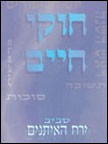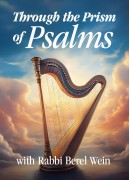Chukei Chaim by Rabbi Berel Wein
Hebrew Book

Item #: B-CHAIM
More Info
Through the Prism of Psalms
7 Lectures

Item #: S450
More Info

From the Second Temple to the Christian Conquest of Spain
History / Part 1 - 400 BCE- 1000 CE
30 Lectures
Set of 30 MP3 Downloads

From the Biography Series
4 Lectures
Set of 4 MP3 Downloads

Jewry at the Turn of the Centuries
1 MP3 Download

Hidden Heroes
1 MP3 Download
OUT INTO THE LIGHT
Darkness is frightening. But it is also comforting, since it removes from our sight the problems and dangers that confront us. Light exposes blemishes, imperfections, difficulties. It is no wonder that restaurants always have dim lighting. It makes the food and the people eating that food look better. Well, there are parts of the Jewish world today that persist in remaining in their ideological darkness and are determined not to come out into the light and face the reality of the problems that confront us. Last month, the indefatigable “peaceniks,” led by Yossi Beilin and his dwindling number of allies, conducted a well-publicized meeting with Hanan Asrawi, Yossi Abadrabo and other henchmen of Arafat. In the darkness of that meeting, these Israelis agreed that the whole problem of violence lay with Ariel Sharon and Israeli stubbornness. This meeting was rewarded with great press and media coverage. Within three days of the meeting, eight Israelis (one of them being an Arab from East Jerusalem) were murdered by the people whom Ashrawi and Abadrabo so ably represent. But no number of murders is apparently sufficient to force the Osloites out of their warm and dark tunnel of smug rectitude – “There is no alternative “- and into the revealing light of the reality as to the true nature of the foe that we face. The light is more troublesome than the darkness. Self-delusion and unfounded hopes are the weapons of darkness. When these are combined with the delusion of intellegentsia infallibility, the results are truly lethal to our cause.
The current “peace camp” in Israel is built upon nostalgia and wild optimism. It is as though the last decade of dealing with Arafat never happened. The same Israeli Leftists meet with the same Palestinian representatives that they have been meeting with for years and solemnly come to “understandings” that are then dutifully publicized as being the latest “basis for settling the dispute.” These “understandings naturally envision greater Israeli concessions than did the previous “understandings” between these people. However, none of these “understandings” has any basis in reality or are they reflective of the reality on the ground. This process of imaginary negotiations is aptly described as whistling in the dark. For in the clear light of day, these meetings and negotiations have accomplished nothing. I had a sign on my desk that read: “Confidence is the feeling that you have until you truly understand the problem.” I think that most of us by now truly understand the problem and are not in a mood to be as foolhardy with our future existence as we once were.
What is to me even more painful, is the fact that a large section of religious Jewry – especially those that style themselves Charedi – prefer to live in the dark and not come out in the light and face the many problems that currently challenge Orthodox Jewry. Last month, a conference was held in northern Israel to discuss the place of public religious observance in the framework of Israeli society and government. The attendees at the conference covered the entire gamut of Israeli life. There were Charedi representatives, secular Jews, avowed atheists, government officials, academicians, heads of yeshivot, rabbis, leaders of non-Orthodox groupings and civic activists. At the end of the conference a resolution was adopted that on the whole strengthened the cause of Jewish unity and public observance of Judaism. The resolution rejected civil marriage and divorce, encouraged Sabbath observance opportunities in the sphere of employment, proposed dialogue with the entire religious community on social and political issues, demanded a solution to the Charedi-army problem, and sought to create a basis for understanding, respect and cooperation within Israeli society. This “Document of Understanding” received wide play in the Israeli media and on the whole I felt that the religious representatives had made their arguments well and tellingly. The Charedi attendees had first consulted with their rabbinic leaders as to the propriety of their attending such a conference and had received their blessings to do so. To me, it therefore appeared to be a perfect win-win situation.
Imagine my surprise and disappointment, when on the day after the conference resolution was publicized, a leading Charedi Bnei Brak newspaper blasted the entire concept of holding such a conference and strongly criticized the Charedi spokesmen who attended it. “We don’t want to share anything with ‘them’” was the headline in the paper. There was also a very vehement denunciation of any type of cooperation with non-Charedi groups and a reiteration of the centuries-old position of complete isolation from the general culture and from any form of society that is not exclusively Charedi. This position as reflected in that newspaper was trumpeted across the general Israeli media and widely criticized and even ridiculed. It also became fodder for the anti-religious politicians who renewed their attack against the Charedim as being “parasites,” “exploiters,” “haters,” etc., who don’t care about anyone else and who only wish to be supported by the many while they, the few, remain isolated and non-productive. And to think that all this damage to the religious community was basically self-inflicted.
The sanctification of tactics that have uniformly failed over the centuries, poses a great problem for the religious Jewish world. All of the invective and bans cast upon the non-Orthodox groups by traditional Jewry over the last two hundred years have not achieved the goal of diminishing or even seriously weakening those movements. So then why should this failed tactic be perpetuated? Attacking the ideas of Zionism, which may have been legitimate, though again unsuccessful, at the beginning of the twentieth century makes little sense at the beginning of the twenty-first century. The State of Israel exists and the entire destiny of the current day Jewish people is intertwined with the state’s existence and success. The largest number of Orthodox Jews in the world resides in Israel. Why then the continuation of the attacks on the Zionist idea, when that idea has become the reality of the State of Israel and taken on therefore an entirely different significance and importance in Jewish life? It is a comfort of residing in darkness that allows one to continue to fight the battles of a century ago, long after history and practicality has settled the matter.
There is a play that is currently the rage of the Israeli theater called “Atom.” It is a bitterly anti-Charedi work, bordering on overt anti-Semitism. Its main theme concerns a Charedi politician who becomes Prime Minister of Israel and attempts to engage Israel in a nuclear war with its Arab neighbors in order to expunge the sins of the secular state. This ridiculous premise is strengthened by evil caricatures of charedim that abound throughout the play. The author of this work unabashedly proclaimed: “I hate religion and its practitioners.” The play and its attitudes represent a darkness of spirit, a hatred of others, an arrogant certainty in the holiness of the playwright’s views. However, a great deal of this darkness is caused by the fact that there is no communication, no discussion, no human interplay between the groupings in Israeli society. I find it hard to understand why the religious world is so convinced that any contact with non-religious society will result in the religious becoming influenced by the non-religious and not vice versa. And, if this axiom of religious society is really true, and I am not convinced at all that it is, is there not something wrong with our educational system and home upbringings that so sap our own-self confidence and self-worth? In any event, closing our eyes to the realities of the society and conditions in which we live and remaining in the comfort of darkness, is certainly not the prescription for curing the ailments that afflict the Jewish world.
I have recently read a very painful book. The book, printed here in Israel and in Hebrew, is called “Vyodea Lishol.” In English, its title would read: “And He Can Ask – 14 monologues of people who stopped practicing Orthodox Judaism.” As the title graphically indicates, this is a book about freedom, rebellion, defection, searching and confusion. All of the fourteen authors of the monologues are men and women who were raised in the National Religious camp, who attended higher yeshivot and seminaries, who served in the Israeli army and whose political orientation has shifted from the Right to the Left. I do not think, nor does the editor of the book propose, that this is a representative sampling of the products of the National Religious/Gush Emunim camp here in Israel. Nevertheless, it is revealing that there is one complaint that is common in all fourteen of the monologues. And that complaint is that they were never able to ask anyone the deep questions and express any doubts regarding Judaism that may have felt during their formative years at home and in the school. Faith was coerced upon them and not nurtured within them. They all mention that they lived a life of fantasy and unreality in the religious community where ideology took precedence over facts and that when societal reality eventually struck them, whether in the army, the university, the marketplace, they were unable to cope with it and abandoned their previous selves. There is a tremendous note of sadness in all of these monologues, accompanied by a tone of subdued anger and bitterness. Though they all claim that no one failed them – not school, teachers, friends, parents – they are troubled by what they see as their failure and the failure of religious society. Painful as it is for an Orthodox Jew to read this book, it should be read by our educators and leaders. It will shed light on our darkness.
Upon discussing this matter with one of my friends, he mentioned that all of the defectors were from the National Religious camp. I told him that there would be no difficulty in assembling fourteen monologues from defectors from the Charedi world as well. There is attrition there as well, and not in insignificant numbers. Individual faith is a matter of individual choice. There is no one that can make another Jew “be religious” – not a parent, not a teacher, not a rabbi. And there are enormously complex and diverse factors, many of them personal and uniquely individual, that enter into one’s choice of being an observant Jew or not. Yet, certainly, injecting a sense of reality and practicality in our religious worldview, more light and a broader perspective, will help strengthen those who wish to choose on behalf of Jewish tradition and a Torah lifestyle.

